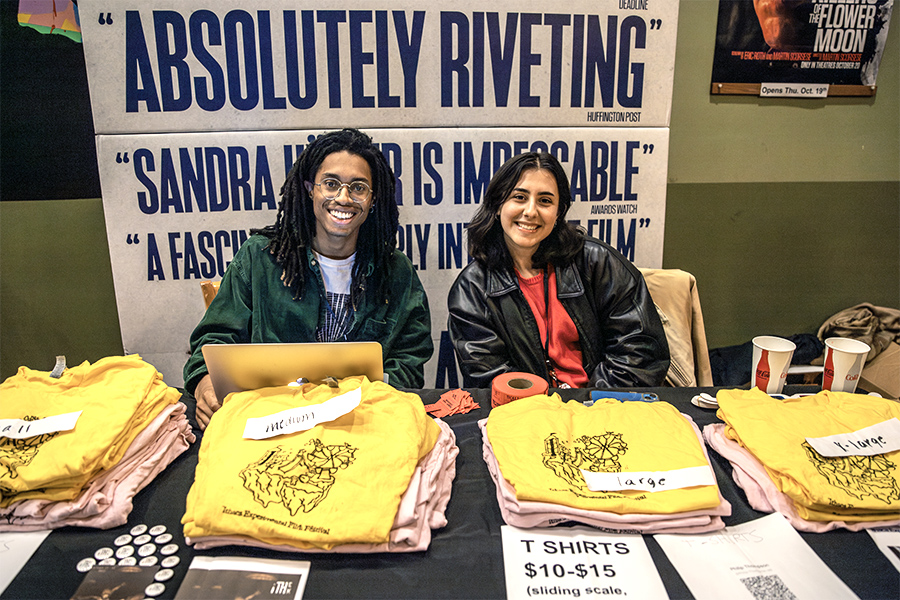Ithaca serves as a hub of opportunity for filmmakers as more and more film festivals come to the area; especially for film students, who can use these new up-and-coming festivals to promote their own work and begin making connections with other filmmakers.
Cinemapolis has been busy hosting film festivals, each with a range of interests from reproductive rights and environmental issues to independent films, many of them in their first year and featuring films from Ithaca College alumni.
The downtown theater is known for promoting student and alumni films with other film festivals, like the Finger Lakes Environmental Film Festival and the Ithaca Short Film Festival, an Ithaca College student-only film festival, and serves as a place for young filmmakers to premier their films on a silver screen.
The Reproductive Rights Film Festival, sponsored by End Abortion Stigma (EAS), ran from Sept. 21 to Sept. 23, with two days of panels via Zoom and one night that showed films by students and alumni with one day that showed three film by other filmmakers.
Sue Perlgut was a panelist and an organizer for the film festival. Perlgut said this is the festival’s first year and that organizing such a program is necessary for young college-aged women to learn about reproductive rights in a safe space with older women who have received abortions and understand that specific perspective.
“We were lucky in New York state when Connie Cook decriminalized abortion,” Perlgut said. “And then Roe v. Wade happened in 1973. So our fight kind of ended. Young people are in that fight now. You have to stand up for your rights. You have to protest, you have to do all the things that we were doing then. We’re trying to communicate that and we’re trying to give support to you to say, ‘This is unacceptable.’ … It was unacceptable before Roe and it’s unacceptable now, and we want [young people] to fight for [their] rights.”
Roe v. Wade, the landmark Supreme Court case protecting the right to abortion, was overturned in June 2022. Perlgut said the inspiration for the festival was to educate young people about the overturning of the law and what media has been made in response to the historic decision made last year.
“It was an attempt to bring the issue to a broader audience,” Perlgut said. “We really wanted to reach out to younger women and college women. … We’re a group of older women, many of whom have had abortions. … We go to speak to classes at colleges and high schools. And we wanted to bring this to a broader audience to people we haven’t talked to. We wanted a discussion to get going.”
The “Common Ground” film festival followed a similar program that combined the discussion of four panelists and a film screening of the Netflix documentary “Common Ground” from Oct. 13–19 at Cinemapolis. The panelists included Christa Núñez, founder of Learningfarm.org; Ryland Engelhart, co-founder of Kiss the Ground; Tina Nilsen-Hodges founder and principal of New Roots Charter school; and Yao “Chacha” Foli, farmer activist educator based in Ithaca.
The area of discussion focused on regenerative agriculture, a passion held by panelist member Foli, who moved from Ghana to Ithaca five years ago. He is now looking to pursue studies in public health at Cornell University after having attended Cazenovia College in 2007. Foli said that although the concept of regenerative agriculture may sound lofty, not much prior knowledge on the subject is necessary to understand what regenerative agriculture means for the environment.
“It’s reinforcing and energizing us to remember how we take care of the earth that feeds and provides for us while talking about regenerative agriculture,” Foli said. “It’s not new. It’s not something you have to have a PhD or master’s in. … Ithaca is ethical. The idea of regenerative agriculture is not new to Ithaca.”
Foli said there is a necessity to having film festivals like the one centered around environmental issues, especially within a town with a high population of young people. He said he hopes that students who attended the film and listened to the panel left with a feeling of understanding and have a deeper consideration for the environment.
“I would like [students] to walk away with the understanding that our small ways of understanding the essence of the rule of environmental justice within our community step toward the solution to pollution,” Foli said. “By defining environmental justice practices, we can promote environmental justice farming practices in our community and promote public health. It’s for our own sake and to maintain the same resources that feed us today and reserve it for the next generation without ruining it.”
The Experimental Film Festival — also in its first year — focused on educating the Ithaca community but was solely focused on independent films. The festival came to fruition by ’21 alumni of the college, Desireé Tolchin, Philip Thompson and Aidan Cronin, and lasted from Oct. 13 to Oct. 15.
Thompson said their overarching goal for their film festival was to be a source of encouragement for young filmmakers in Ithaca, which was why they held the festival in the fall. He said that in his own experience, he had not previously known any filmmakers aside from his professors at college. Thompson said he hopes the Experimental Film Festival will act as a chance for film students to have a different experience than he did.
“Bring artists together, local artists, again, that’s our goal,” Thompson said. “And if you’re a student in Ithaca or you’re a local artist, we can bring everyone together and have everyone discuss and share their work and just talk about how we can all grow and develop as artists. That is our number one goal.”
Thompson said the festival had three student ticket options and allowed for students to not only come from Ithaca and Cornell University, but from colleges like Binghamton and Syracuse, too. Essentially, the festival was geared toward informing students and getting new kinds of films in front of the eyes of the next generation of filmmakers.
“It kind of made for a diverse environment because we had people from town and we had students and we had filmmakers and professors — some filmmakers came in and visited,” Thompson said. “We had a filmmaker come from Brooklyn. So filmmakers from all over came to this one place where the students can get exposed to different kinds of things, different kinds of films.”
The group featured several films, including short films from Ithaca College alumni Sophia Feuer ’18 and Tyler Macri’s ’18 “A Black Hole is A Black Hole in the Ground,” who made the film as students and Crystal Kayiza’s ’15 film, “Rest Stop.” Additionally, the group showed Mitch McCabe’s, assistant professor of media arts, sciences and studies, “Civil War Surveillance Poems Pt 1,” which is one part of a seven-part feature documentary.
“It was really exciting to see a diverse group of people come together and watch experimental films; like, that’s the whole reason why we wanted to do this in Ithaca and when we went to school, we didn’t see it as much, so we’re really excited to bring that to the area,” Tolchin said.





















